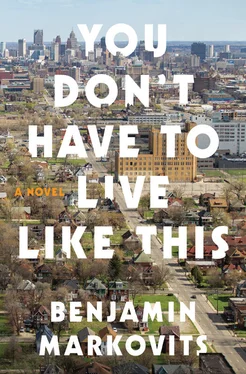“Is this it?” I asked him.
“How bad do you want it to be?” he said.
Then we came upon streets where the houses looked stepped on. Their insides lay spread out over the yards: refrigerators and rocking horses, cable wires, cheap carpeting. It looked like the end of the world.
“Satisfied now?” my dad said, and I heard his voice in my head, asking the same question, as I drove through Detroit. There wasn’t any traffic on the road to force me along. Mostly what I saw was empty lots, not falling houses — block after block of grassland. Trees grew out of the roofs of abandoned buildings. There were abandoned cars, too, and tires, shopping carts and heaps of trash sitting where houses used to stand. The effect was rural, not suburban. Snow turned the lots into fields, and the windows of occupied homes glowed like small fires.
But then I came across a street with the lights on — a row of double-deckers, with front porches and big bays, new siding. Trees, at regular intervals, lined the strip of lawn between sidewalk and road, and cars stood parked along the curb. Probably I’d be living somewhere like this. Robert told me he had a place picked out.
If you looked closely you could see boarded windows and broken steps, but there were also satellite dishes and washing lines, trash cans waiting for collection and kids’ bikes on the stoops. There weren’t any street lamps, though, and when the sun went down behind the trees and telephone poles, I felt about as lonely as I ever have in my life. After pulling to the side of the road, I checked the route to Robert’s house by the light of the glove compartment. I didn’t want to show myself in a parked car.
IT WAS ONLY FIVE MINUTES away, but east of Van Dyke the neighborhood changed character. The houses got bigger and turned from clapboard to stone; the gardens spread out. I saw a private security vehicle making the rounds. It waited on the other side of the road while I rolled into Robert’s drive, which had an electric gate — part of a tall metal fence, topped by spearheads.
I had to step out of the car to announce myself by intercom. This was the first time I’d been out of the driver’s seat since lunch. The air smelled good and cold; it smelled of wood-fire smoke. And when the gate swung open, the security vehicle moved on.
Three other cars sat in the drive. I parked behind a Lexus. The house itself was stuccoed and painted yellow, lit up from below by spotlights planted under the hedges, which grew under the windows. The windows were taller than me, and arched, and there were lots of them. I don’t know much about American architecture, but the style looked like something from the 1920s and reminded me of what Robert had said over the phone. It suggested “good times.” I pushed the bell and heard it jangling — my heart beat faster than it should have.
Robert was changing for dinner when I got inside. The maid let me in, or maybe the cook, since she hurried afterwards back into the kitchen.
The entrance hall had a grand piano in it, covered in photographs and invitations. I looked at the photos for a minute and didn’t recognize anyone in them. There were teenage girls and family portraits, pictures of holidays and weddings, but the cards were mostly addressed to Mr. Robert James. From the Rotary Club of Detroit and the Mayor’s Office, from the Ford Foundation and the editors of Time Inc. There were also a number of private invitations: “Mr. and Mrs. David Koerning request the pleasure of your company,” etc. Nobody else came down.
On one side an opened door led to a living room, and I noticed someone on the couch, reading a newspaper. He stood up when I walked in and shook my hand.
“Tony Carnesecca,” he said. “I guess you’re one of Robert’s college buddies.”
“That’s right.”
“It’s like a fucking reunion around here.”
There was a fire in the fireplace and a decanter of wine on the side table, with several glasses.
“What do you mean?”
Tony was smiling and showing his teeth, but I think he wanted to offend me, too. He offered me a glass of wine.
“What I really need is to take a leak,” I said. He pointed the way, and when I came back in, Tony was still on his feet; he gave me a drink.
“If this is a reunion,” I said, “what are you doing here?”
“Because I grew up in the city and actually know what’s going on in this place. Even if I didn’t go to Yale.”
Tony had the forearms of a short man who lifts weights; he wore the kind of T-shirt that would show them off. Maybe he was my age or a few years older. His hair had gel in it and was carefully presented — a working-class white man’s haircut. In fact, he was a freelance writer who dropped out of grad school when he got a contract for his memoir about Detroit. His essays had also been published in Vanity Fair and The New York Times . He told me all this in the first few minutes, while we waited for Robert to come down.
“You’re a bunch of assholes, you know that?” Tony said. “And here comes the pick of the lot.”
I thought he meant Robert, but an older man walked in, wearing tasseled shoes and a gray silk jacket and tie. This was Clay Greene, one of Robert’s business partners. I kept thinking of him as Professor Greene — he taught at Yale, and even after all this time I found it hard to imagine myself on a level with him. Clay poured himself a glass of wine and sat down in an armchair by the fire. Tony went back to his newspaper on the couch, but I had itchy feet after two days in the car and wanted to look around. There was a bookcase against one of the windows so I looked at Robert’s books. It touched me to see so many of our college editions: Democracy in America, The Republic, Of Mice and Men .
“Why do you think we’re all assholes?” I said to Tony.
“Because you’re trying to help and you haven’t got a clue. In a place like Detroit that makes you one of the bad guys.”
But I didn’t answer him because Beatrice had just come in. Her red hair was piled up high on her head, stretching her neck out long — she looked older and more elegant and somehow on display. From the expression on her face I couldn’t tell if she was happy to see me.
Isuppose I should say something about all these people — about how we met. College friendships can take a lot of explaining. The cement is still wet, deep impressions get made, but there are also a lot of casual footprints that leave permanent marks. When I graduated from Yale, I was determined not to be one of those guys who thinks, they were the best four years of my life. And I managed to move pretty far away from that whole scene, as far as Wales. But now I was right back in the middle of it again.
Robert had a room on the same floor as mine freshman year, but I noticed him for the first time in the dining hall lunch line. I was waiting for a plateful of baked ziti when he struck up a conversation with the guy behind the counter — this tall kind of rickety black guy, maybe fifty years old, who wore a dirty white hat and an apron with his name stitched onto it. Robert introduced himself, like a gentleman.
“Willy,” he said. “Is that your name? Do you mind if I call you Willy?”
“Go right ahead,” Willy told him, and Robert stuck out his hand.
“Robert James.”
He had to reach over the food counter, and Willy, who clearly felt uncomfortable, wiped his dirty, sweaty palm on his apron for about a minute before taking it. I remember thinking, it doesn’t matter if you call him Willy, he’ll still call you sir.
The reason we started hanging out is that Robert saw the squash racket sticking out of my backpack. Whenever he couldn’t sleep he’d tap on my door — I never turned the lights off till two in the morning.
Читать дальше












